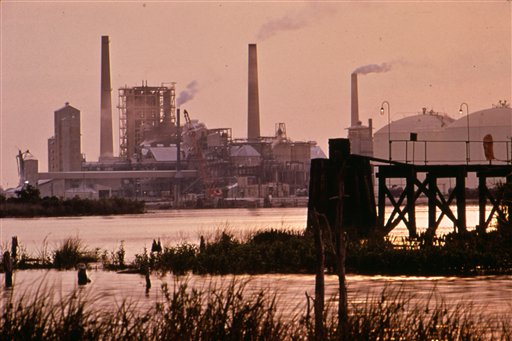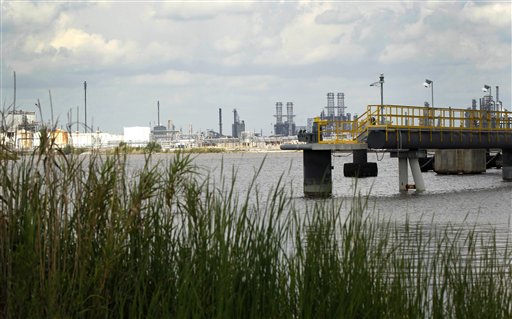WASHINGTON – A polluted drainage ditch that once flowed with industrial waste from Lake Charles, La., petrochemical plants teems with overgrown, wild plants today.
A light-rail line zips past the spot where a now-defunct Portland, Ore., gasoline station advertised in 1972 that it had run out of gas.
A smoking Jersey City, N.J., dump piled with twisted, rusty metal has disappeared, along with the twin towers of the World Trade Center in lower Manhattan that were its backdrop.
Forty years after the Environmental Protection Agency sent an army of nearly 100 photographers across the country to capture images at the dawn of environmental regulation, The Associated Press went back for Earth Day this year to see how things have changed. It is something the agency never got to do because the Documerica program, as it was called, died in 1978, the victim of budget cuts.
But AP photographers returned to more than a dozen of those locations in recent weeks, from Portland to Cleveland and Corpus Christi, Texas. Of the 20,000 photos in the archive, the AP selected those that focused on environmental issues, rather than the more general shots of everyday life in the 1970s.
Gone are the many obvious signs of pollution — clouds of smoke billowing from industrial chimneys, raw sewage flowing into rivers, garbage strewn over beaches and roadsides — that heightened environmental awareness in the 1970s, and led to the first Earth Day and the EPA’s creation in 1970. Such environmental consciousness caused Congress to pass almost unanimously some of the country’s bedrock environmental laws in the years that followed.
Today’s pollution problems aren’t as easy to see or to photograph. Some in industry and politics question whether environmental regulation has gone too far and whether the risks are worth addressing, given their costs.
Republican presidential contender Mitt Romney has called for the firing of EPA chief Lisa Jackson, while GOP rival Newt Gingrich has said the EPA should be replaced altogether.
“To a certain extent, we are a victim of our own success,” said William Ruckelshaus, who headed the EPA when it came into existence. “Right now, EPA is under sharp criticism partially because it is not as obvious to people that pollution problems exist and that we need to deal with them.”
Environmental laws that passed Congress so easily in Ruckelshaus’ day are now at the center of a partisan dispute between Republicans and Democrats. Dozens of bills have been introduced to limit environmental protections.
In the 1970s, the first environmental regulations were just starting to take effect, with widespread support. Now, according to some officials in the oil and gas and electric utility industries, which are responsible for the bulk of emissions and would bear the greatest costs, the EPA has gone overboard with rules.
Jim DiPeso of ConservAmerica, a group that recently changed its name from Republicans for Environmental Protection, says the EPA is caught in the center of a perfect storm. “This time of greater cynicism about government, more economic anxiety and the fact that the problems are not immediately apparent, has created this political problem for EPA,” he said.
In an interview, Jackson said she believes that people in the United States still want to protect the environment. “There’s a large gulf between the rhetoric inside the Beltway to do everything from cut back on EPA to get rid of the whole place, and what the American people would actually stand for,” she said. “It’s very easy to make rash statements without thinking about what that means to the health of everyday Americans.”
A 2010 Pew Research Center survey showed that 57 percent of those questioned held a favorable view of the EPA, compared with a 1997 poll that showed 69 percent with a positive view of the agency. A CNN/Opinion Research Corp. poll taken last year found that 71 percent of people surveyed said that the government should continue provide money to the EPA to enforce regulations to address global warming and other environmental issues.
“We are not done. We still have challenges we have to face,” Jackson said.
Send questions/comments to the editors.




Success. Please wait for the page to reload. If the page does not reload within 5 seconds, please refresh the page.
Enter your email and password to access comments.
Hi, to comment on stories you must . This profile is in addition to your subscription and website login.
Already have a commenting profile? .
Invalid username/password.
Please check your email to confirm and complete your registration.
Only subscribers are eligible to post comments. Please subscribe or login first for digital access. Here’s why.
Use the form below to reset your password. When you've submitted your account email, we will send an email with a reset code.